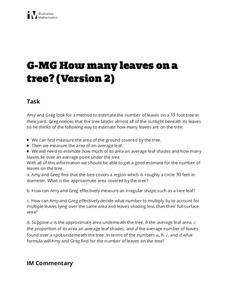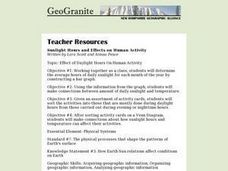Curated OER
Energy Forms
Students explore energy by participating in a science lab in class. In this energy form lesson, students define the different types of energy such as light, mechanical and sound while examining energy measuring tools in class. Students...
Curated OER
Radiation Budget
Students solve the mathematical word problems by looking at the Earth's Energy Budget Diagram. They will work in small groups and then develop their own unique math problems from the diagram and share with the class.
Teach Engineering
Win that Bid! Selling Your Power Solution
Power up! Class members research a type of power production using a great resource featuring a real-world problem. Groups select a type of power generation and pretend that they represent an engineering firm for their chosen power type....
Curated OER
Unit 2 Sun & Stars
Students describe stellar objects using terms such as stars, planets, satellites, orbits and light. In this sun and stars unit, students research stellar objects through seven individual lessons discovering star characteristics, how...
Curated OER
Designing a Solar Concentrator
Students design and build a solar concentrator. In this physics lesson plan, students evaluate their design and convince everyone why theirs is the best. They create a presentation and share it with the class.
Curated OER
A Bird's Eye Look at the Sun-Earth System
In this Sun-Earth system worksheet, students fill in blanks with the proper terms from a given list to complete a summary of the relationship between the Sun and the Earth. A major topic includes how solar storms effect the Earth and the...
Curated OER
Coronal Mass Ejections
In this coronal mass ejections worksheet, students observe a time line of events that took place during a solar storm. Students use the time line to answer 3 questions about the solar storm and the time it took to reach Earth. Students...
Curated OER
Sun and Earth
Students explore the sun, its structure, how big it is and how far away it is. In this solar system lesson students complete a lab activity on dew point and weather.
Mascil Project
Closed Greenhouses
Controlling the efficiency of a greenhouse is a mathematical task. A collaborative project challenges learners to create an efficiency plan for a closed greenhouse. Using algebraic equations, they consider a set of constraints, design...
Curated OER
The Appliance Explosion
Students explain why the number of appliances used today differs greatly from the number used previously. They construct a bar graph to show changes in appliance use over a period of time. They also list appliances that could be eliminated.
Curated OER
Shadowing a Musher For Nine Days
Seventh graders follow and record the progress of a musher on the Iditarod race. They access the official Iditarod website, determine the musher's overall speed, the daily average temperature and daily hours of sunlight, and develop a...
Curated OER
Investigating and Using Biomass Gases
Learners examine the definitions of biomas gasification and generate their own biomass gas. In this renewable energy lesson students collect gases and roast a marshmallow.
Curated OER
Invisible Rays
Students explore physical science by completing a lab assignment. In this sunlight lesson, students define a list of scientific vocabulary terms and complete fill in the blank questions. Students conduct a photographic experiment in...
Green Planet Solar Energy.com
Order of Operations 2 - More Practice!
Your learners will get plenty of practice calculating expressions remembering to use order of operations in this worksheet.
Illustrative Mathematics
How Many Leaves on a Tree? (Version 2)
A second attack at figuring out the number of leaves on a tree, this activity makes both an excellent follow-up to version 1 and a stand-alone activity. Learners practice setting parameters and deciding acceptable estimate precision, and...
Illustrative Mathematics
Growing Bean Plants (Grade 2)
After planting a bean seed in a jar, young scientists observe the growth patterns over several days. As the bean becomes a sprout, and the sprout becomes a plant, partners measure and plot the data. They notice patterns, practice...
Teach Engineering
Designing a Spectroscopy Mission
In this mind-bending activity, young engineers explore this question of whether or not light actually bends. Using holographic diffraction gratings, groups design and build a spectrograph. The groups then move on research a problem...
Curated OER
Collecting the Rays
Students investigate the affect shape has on the ability of a solar panel to collect sunlight. In this collecting sunlight using a solar panel lesson, students determine which solar panel shape collects the most sunlight. Students use...
Curated OER
UV Beads
Students recognize preventitive measures that can be taken to reduce the risks associated with exposure to solar radiation. They explain why solar radiation can be harmful. They utilize beads that turn color when exposed to UV rays. Good...
Curated OER
Do Plants Eat?
Students explain that photosynthesis is a process that plants use to convert light energy into glucose. They summarize photosynthesis as a chemical process in which the plant uses carbon dioxide and water to form glucose and oxygen.
Curated OER
What’s That, I Can’t Hear You?
Young scholars investigate forms of energy as well as light and sound. In this science lesson, students participate in hands-on activities that require them to evaluate how sound affects astronauts in flight. A video of this lesson being...
Curated OER
The Legend of the Poinsettia
Students explore the poinsettia and its symbolism as a Christmas flower. Students will listen to a story about the poinsettia and its origins in Mexico and discuss what they know about Mexico. They will discuss the poinsettia's...
Teach Engineering
Bone Mineral Density Math and Beer's Law
Hop into a resource on Beer's Law. A PowerPoint presentation introduces Beer's law as part of calculating bone density from X-ray images in the sixth lesson in the series of seven. Individuals work on practice problems with this law and...
Curated OER
Effect of Daylight Hours on Human Activity
Students determine the average hours of daily sunlight for each month of the year by constructing a bar graph. They develop a understanding of how the amount of daylight hours varies by month and how that affects both temperature and...

























